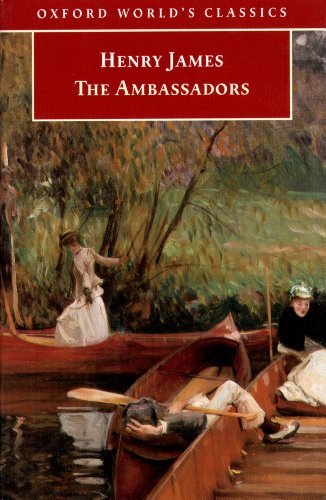The Ambassadors

Rating: 3.1/5
Author: Henry James
Format: Hardcover
Pages: Methuen: 458, Harpers: 432
Publisher: Harpers & Brothers (US), Methuen Publishing (UK)
Publication Date: Methuen: 24 September 1903; Harpers: 6 November 1903
Language: English
Genre: Dark Comedy
ISBN-10: 1377494764
ISBN-13: 978-1377494760
Cost: Rs. 51.45 (kindle edition)
Plot:
One of Henry James's three final novels, all of which have sharply divided modern critics, The Ambassadors is the finely drawn portrait of a man's late awakening to the importance of morality that is founded not on the dictates of convention but on its value per se.
Sent from Massachusetts by the formidable Mrs. Newsome to recall her son, Chad, from what she assumes to be a corrupt life in Paris, Strether finds his intentions subtly and profoundly transformed as he falls under the spell of the city and of his charge. He is quick to perceive that Chad has been not so much corrupted as refined, and over the course of the hot summer months in Paris he gradually realizes that this discovery and acceptance of Chad's unconventional new lifestyle alter his own ideals and ambitions.
Review:
Throughout ‘The Ambassadors’, the theme of liberation from a starving, confined, emotional life into a more generous and decorous existence plays out in a consistent manner. It is noteworthy that James did not portray Paris in the cliché manner - as a faultless paradise.
Throughout the novel, the narrator constantly locates events in specific places, and characters repeatedly refer to specific locations. Upon meeting in England, Miss Gostrey tells Strether that she has met his friend Waymarsh in Milrose, Connecticut. Likewise, Strether explains that he comes from Woollett, Massachusetts.
The character of ‘Strether’ embodies the difficulties to live life in a carefree manner. When Strether first meets Miss Gostrey, he suggests his inability to fully appreciate the moments of his life. He feels as though he has suffered from this inability throughout his entire youth and adulthood, and he regrets having missed out on significant life experiences. After reaching middle-aged, Strether still fears that he will never be able to live fully in the moment. But, in Paris, he begins to live a life fully drenched in new experiences.
One gets to see the different emotions of the characters being evoked and the reasons behind them towards the European setting. For instance, Jim Pocock wants to see the degeneracy for which Paris has become famous in the United States. In contrast, Waymarsh hates Paris because it fails to offer him what he likes about his American home.
Henry James got the central idea for The Ambassadors from an anecdote about his friend and fellow-novelist William Dean Howells, who, whilst visiting his son in Paris, was so impressed with the amenities of European culture that he wondered aloud if life hadn't passed him by.
Adaptations:
- The BBC television adaptation of the novel for their ‘Play of the month’ television series first aired on March 13, 1977.
- A musical theatre version of The Ambassadors, titled Ambassador, was first produced in 1971 in London's West End, then on Broadway in 1972.
About the Author:
Henry James, (born April 15, 1843, New York, U.S.—died February 28, 1916, London, England), American novelist and, as a naturalized English citizen from 1915, a great figure in the transatlantic culture. His fundamental theme was the innocence and exuberance of the New World in clash with the corruption and wisdom of the Old, as illustrated in such works as Daisy Miller (1879), The Portrait of a Lady (1881), The Bostonians (1886), and The Ambassadors (1903).















































